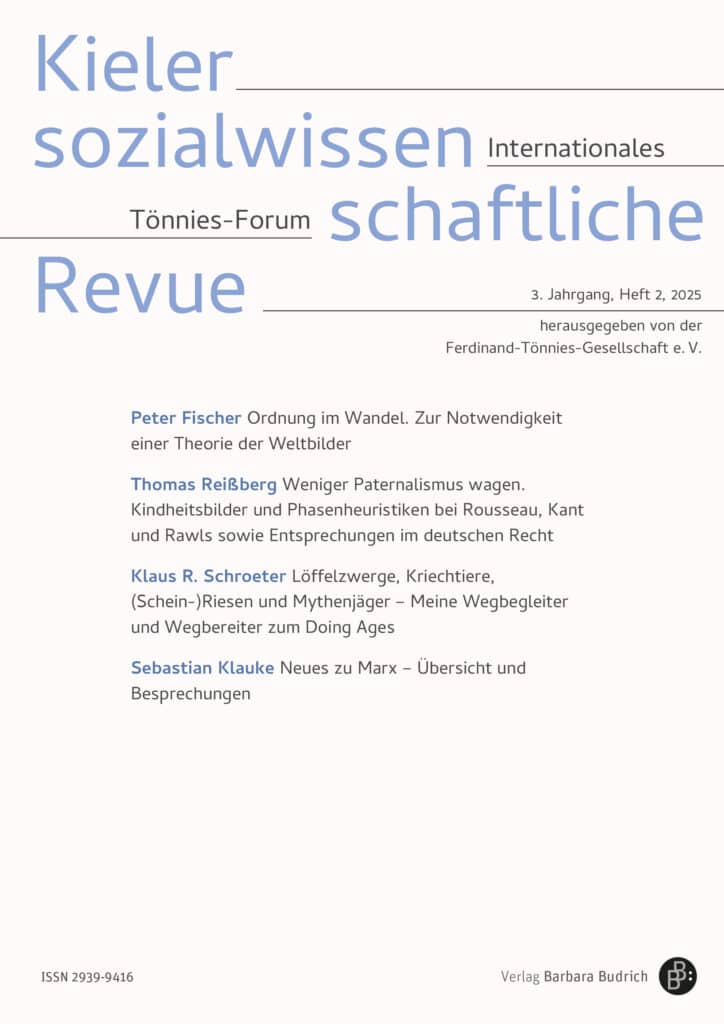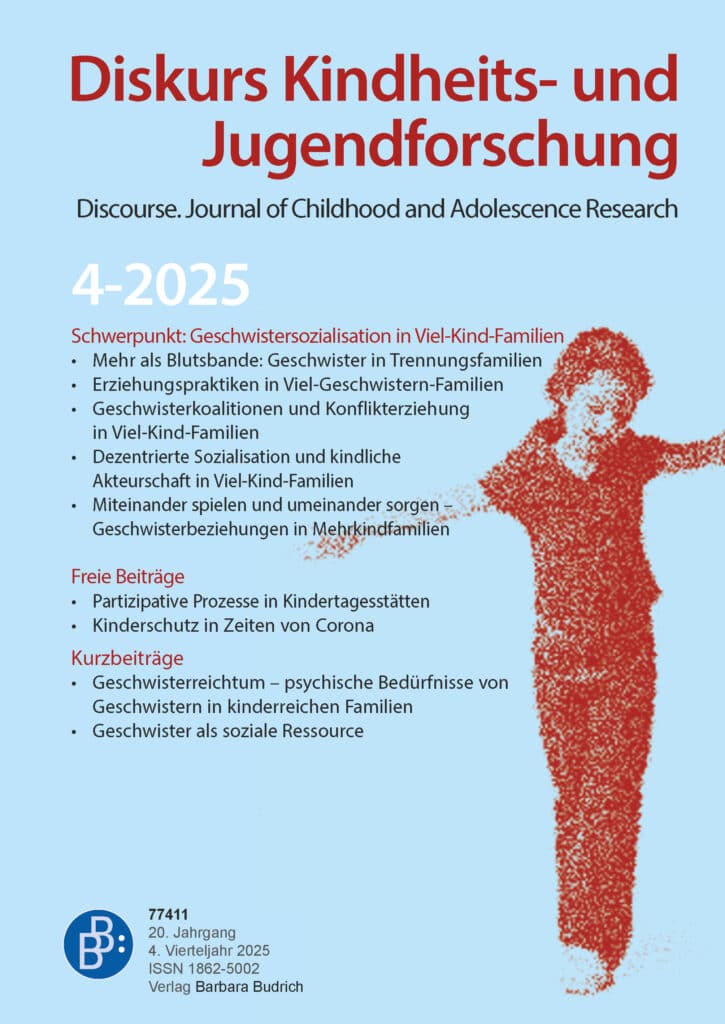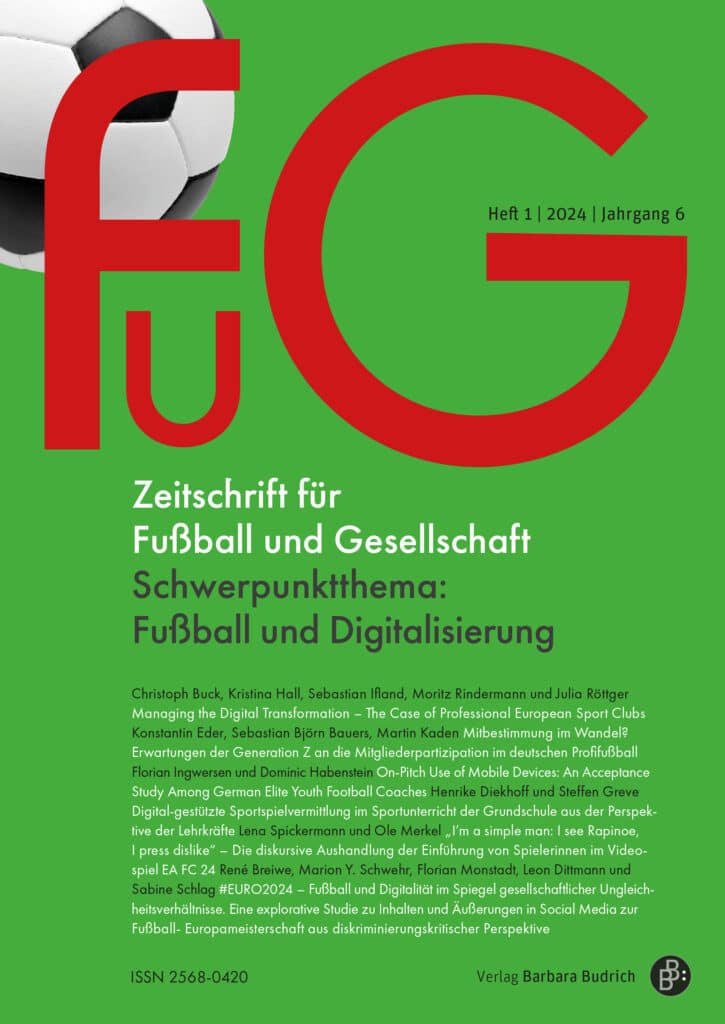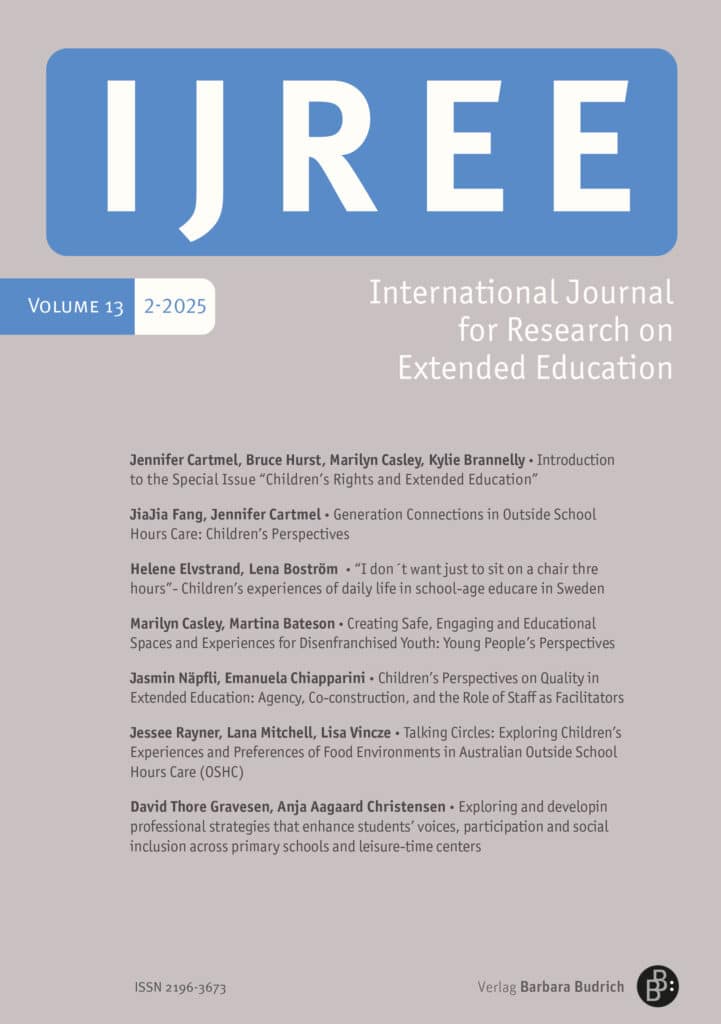Informationen zur Zeitschrift
Startseite » Programm » IJAR 3-2020 | Free Contributions
IJAR 3-2020 | Free Contributions
Erscheinungsdatum : 13.01.2021
0,00 € - 29,00 €
Inhalt
IJAR – International Journal of Action Research
3-2020: Free Contributions
Danilo R. Streck: Editorial
Articles
Norman Chivasa: Instituting village savings and loan associations scheme through action research in Zimbabwe
Ronaldo Akiyoshi Nagai / Alvair Silveira Torres Junior: Lean Product and Process Development and Set-Based Concurrent Engineering in the Dining Industry: the experience of an American-Asian fusion restaurant
Corinne Butschi / Guillermina Chabrillon / Ingeborg Hedderich: International research: challenges, limitations and conditions for success. Reflections on a participatory international project with children
Lise Billund / Poul Nørgård Dahl: Recognition-based Action Research. Inspired by third generation critical theory and dialectic relationship theory
Sandro de Castro Pitano / Rosa Noal / Cheron Zanini Moretti: Repoliticising Participatory/Action Research: From Action Research to Activism: some considerations on the 7th Action Research Network of Americas Conference
Download of Table of Contents / Inhaltsverzeichnis herunterladen
Download of single articles (partly in Open Access / partly fee-based): ijar.budrich-journals.com
You can register here for the IJAR alert.
Einzelbeiträge zum Download (teils Open Access / teils kostenpflichtig): ijar.budrich-journals.com
Sie können sich hier für den IJAR-Alert anmelden.
Zusätzliche Information
| Verlag | |
|---|---|
| ISSN | 1861-1303 |
| eISSN | 1861-9916 |
| Jahrgang | 16. Jahrgang 2020 |
| Ausgabe | 3 |
| Erscheinungsdatum | 13.01.2021 |
| Umfang | 100 |
| Sprache | Englisch |
| Format | 17 x 24 cm |
| DOI | |
| Open Access-Lizenz | |
| Homepage |
Autor*innen
Schlagwörteraction research, Activism, Arna action research network of the americas, COVID-19, Culinary innovation, Dialectics, Dining innovation, Intercultural co operation and understanding, International participatory research, Interpersonal realationship, Lean product development, Mutuality, participation, Photovoice, Product development, Recognition, Repoliticisation, Set based concurrent engineering, Village savings scheme, Zimbabwe
Abstracts
Instituting village savings and loan associations scheme through action research in Zimbabwe (Norman Chivasa)
Village savings and loan associations schemes have become one of the critical survival strategies amidst poverty, inequality and financial exclusion thus helping low income communities to ride out poverty and make their savings and to eke out a living. However, the use of scientific procedures by ordinary people when establishing such initiatives in their villages is under-reported. This study, therefore, sought to test the utility of the action research (AR) methodology in establishing a low cost village savings and loan associations scheme intervention, with a view to assessing the extent to which the scheme can improve the livelihoods of members of the scheme, and draw lessons for future interventions. The process involved planning, designing, establishing and evaluating a village savings and loan association scheme initiative involving 15 individual members (inclusive of the researcher) in ward 8 of Seke district, Zimbabwe. Results showed that creating village savings and loan associations is possible using action research, as community participation in the design, implementation and day-to-day operations of such initiatives guaranteeing ownership and control of the initiative by the host group scheme are almost natural to action research. One of the comparative advantages of using action research is that it creates spaces for ordinary people to share their experiences, reflect, and come up with context-specific solutions, as they take responsibility for their financial wellbeing, thus helping to meet their socio-economic needs and aspirations. The strength of village savings and loan associations is that they can be replicated. The study recommends that in the era of COVID-19, social distancing rules and regulations introduced to contain the virus should be observed. Keywords: Action research; COVID-19; village savings scheme; Zimbabwe
» Download Single Contribution Free of Charge (Budrich Journals) / Einzelbeitrag kostenlos herunterladen (Budrich Journals)
Lean Product and Process Development and Set-Based Concurrent Engineering in the Dining Industry: the experience of an American-Asian fusion restaurant (Ronaldo Akiyoshi Nagai and Alvair Silveira Torres Junior)
The purpose of this paper is to investigate the implications of a culinary innovation process when adopting manufacturing industry concepts such as LPPD: Lean Product and Process Development. The action research structured in five steps (semi-structured interviews, process mapping, training, and implementation of a new process, process observation, and compilation/feedback of results) allowed the introduction of the LPPD in the culinary innovation process. Results showed that despite the innovation process of a restaurant being based on tacit knowledge, concepts from the manufacturing innovation process could be adopted. Findings can contribute to the multidisciplinary studies involving innovation, the hospitality industry, and the action research application on operations management. Keywords: Dining innovation, Culinary innovation, Lean Product Development, Set-Based Concurrent Engineering, product development
» Download Single Contribution Free of Charge (Budrich Journals) / Einzelbeitrag kostenlos herunterladen (Budrich Journals)
International research: challenges, limitations and conditions for success. Reflections on a participatory international project with children (Corinne Butschi, Guillermina Chabrillon and Ingeborg Hedderich)
International research is common practice in many fields of science and a variety of international projects from the most diverse fields of research can be found through the major academic search engines. However, expanding the search in the direction of metaperspectival reflection on international participatory research might be unsuccessful, as there is scarce literature on the topic. This article is based on experiences with children in the international participatory research project called “Learning Together, Living Diversity”, which was carried out using the photovoice method to involve the children in the process as co-researchers. As international research differs considerably from national research, many challenges may be encountered, especially in field research and mainly in regards to getting in touch and interacting with the foreign country, its people and culture. The aim of this paper is to put into writing the reflexive processing of the cross-border research experience of the two cooperation partners Guillermina Chabrillon (Argentina) and Corinne Butschi (Switzerland), who planned and organised the field work in two Argentinian kindergartens together. The challenges which they faced and the role of both language and cultural background will be described in a practical way. It will be shown that reliable and good cooperation partnerships become even more important when the logistics of international research projects is not only complicated by distance, but also by language and cultural barriers. Examples of the major challenges and the role of culture and other contextual factors in project planning and logistics when crossing linguistic and cross-cultural boundaries will be included, with the purpose of contributing to stimulating further research and a greater number of successful international cooperation partnerships. Keywords: International participatory research, intercultural co-operation and understanding, photovoice
» Download Single Contribution Free of Charge (Budrich Journals) / Einzelbeitrag kostenlos herunterladen (Budrich Journals)
Recognition-based Action Research. Inspired by third generation critical theory and dialectic relationship theory (Lise Billund and Poul Nørgård Dahl)
In action research the quality of the interpersonal relationship between the researcher and the practioners is significant, as it affects which knowledge about the problem explored it is possible to obtain, just as the problem itself affects how that relationship evolves. The problem and the interpersonal relationship are thus dialectically connected. Therefore, the action researcher must have a dual focus concerned with generating knowledge and development in both areas. With that in mind, this article develops Recognition-based Action Research, where Axel Honneth’s critical, sociological perspective on society is combined with Anne-Lise Løvlie Schibbye’s dialectical relationship perspective on interpersonal relationships: with both perspectives grounded in Georg W.F Hegel’s thoughts on recognition. Keywords: Action research, recognition, interpersonal realationship, mutuality, dialectics
» Buy Single Contribution (Budrich Journals) / Einzelbeitrag kaufen (Budrich Journals)
Repoliticising Participatory/Action Research: From Action Research to Activism: some considerations on the 7th Action Research Network of Americas Conference (Sandro de Castro Pitano, Rosa Elena Noal and Cheron Zanini Moretti)
The seventh conference of the Action Research Network of the Americas (ARNA) took place in Montreal, Canada, from the 26th to 28th of June, in 2019. Having as title “Repoliticising Participatory/Action Research: From Action Research to Activism”, the event gathered people from different areas of practice coming mostly from the North American countries: Canada, United States and Mexico. The discussion presented here is based on notes made by the authors in the course of the conference, in which 40 words/keywords were identified, serving as a base to debate the validity of the principles of participatory research and action research in its repoliticisation and activism. Thus, we presented a systematisation of some key themes of the conference, among them, the commitment with the rupture: in relation to the traditional practices of research, the role and the social responsibility of the universities and the transforming character of participation, with emphasis in the effort for its repoliticisation and activism. Keywords: ARNA (Action Research Network of the Americas); Participation; Action Research; Activism; Repoliticisation
» Download Single Contribution Free of Charge (Budrich Journals) / Einzelbeitrag kostenlos herunterladen (Budrich Journals)
Inhalt
Inhalt
IJAR – International Journal of Action Research
3-2020: Free Contributions
Danilo R. Streck: Editorial
Articles
Norman Chivasa: Instituting village savings and loan associations scheme through action research in Zimbabwe
Ronaldo Akiyoshi Nagai / Alvair Silveira Torres Junior: Lean Product and Process Development and Set-Based Concurrent Engineering in the Dining Industry: the experience of an American-Asian fusion restaurant
Corinne Butschi / Guillermina Chabrillon / Ingeborg Hedderich: International research: challenges, limitations and conditions for success. Reflections on a participatory international project with children
Lise Billund / Poul Nørgård Dahl: Recognition-based Action Research. Inspired by third generation critical theory and dialectic relationship theory
Sandro de Castro Pitano / Rosa Noal / Cheron Zanini Moretti: Repoliticising Participatory/Action Research: From Action Research to Activism: some considerations on the 7th Action Research Network of Americas Conference
Download of Table of Contents / Inhaltsverzeichnis herunterladen
Download of single articles (partly in Open Access / partly fee-based): ijar.budrich-journals.com
You can register here for the IJAR alert.
Einzelbeiträge zum Download (teils Open Access / teils kostenpflichtig): ijar.budrich-journals.com
Sie können sich hier für den IJAR-Alert anmelden.
Bibliografie
Zusätzliche Information
| Verlag | |
|---|---|
| ISSN | 1861-1303 |
| eISSN | 1861-9916 |
| Jahrgang | 16. Jahrgang 2020 |
| Ausgabe | 3 |
| Erscheinungsdatum | 13.01.2021 |
| Umfang | 100 |
| Sprache | Englisch |
| Format | 17 x 24 cm |
| DOI | |
| Open Access-Lizenz | |
| Homepage |
Produktsicherheit
Bewertungen (0)
Bewertungen
Es gibt noch keine Bewertungen.
Autor*innen
Autor*innen
Schlagwörter
Schlagwörteraction research, Activism, Arna action research network of the americas, COVID-19, Culinary innovation, Dialectics, Dining innovation, Intercultural co operation and understanding, International participatory research, Interpersonal realationship, Lean product development, Mutuality, participation, Photovoice, Product development, Recognition, Repoliticisation, Set based concurrent engineering, Village savings scheme, Zimbabwe
Abstracts
Abstracts
Instituting village savings and loan associations scheme through action research in Zimbabwe (Norman Chivasa)
Village savings and loan associations schemes have become one of the critical survival strategies amidst poverty, inequality and financial exclusion thus helping low income communities to ride out poverty and make their savings and to eke out a living. However, the use of scientific procedures by ordinary people when establishing such initiatives in their villages is under-reported. This study, therefore, sought to test the utility of the action research (AR) methodology in establishing a low cost village savings and loan associations scheme intervention, with a view to assessing the extent to which the scheme can improve the livelihoods of members of the scheme, and draw lessons for future interventions. The process involved planning, designing, establishing and evaluating a village savings and loan association scheme initiative involving 15 individual members (inclusive of the researcher) in ward 8 of Seke district, Zimbabwe. Results showed that creating village savings and loan associations is possible using action research, as community participation in the design, implementation and day-to-day operations of such initiatives guaranteeing ownership and control of the initiative by the host group scheme are almost natural to action research. One of the comparative advantages of using action research is that it creates spaces for ordinary people to share their experiences, reflect, and come up with context-specific solutions, as they take responsibility for their financial wellbeing, thus helping to meet their socio-economic needs and aspirations. The strength of village savings and loan associations is that they can be replicated. The study recommends that in the era of COVID-19, social distancing rules and regulations introduced to contain the virus should be observed. Keywords: Action research; COVID-19; village savings scheme; Zimbabwe
» Download Single Contribution Free of Charge (Budrich Journals) / Einzelbeitrag kostenlos herunterladen (Budrich Journals)
Lean Product and Process Development and Set-Based Concurrent Engineering in the Dining Industry: the experience of an American-Asian fusion restaurant (Ronaldo Akiyoshi Nagai and Alvair Silveira Torres Junior)
The purpose of this paper is to investigate the implications of a culinary innovation process when adopting manufacturing industry concepts such as LPPD: Lean Product and Process Development. The action research structured in five steps (semi-structured interviews, process mapping, training, and implementation of a new process, process observation, and compilation/feedback of results) allowed the introduction of the LPPD in the culinary innovation process. Results showed that despite the innovation process of a restaurant being based on tacit knowledge, concepts from the manufacturing innovation process could be adopted. Findings can contribute to the multidisciplinary studies involving innovation, the hospitality industry, and the action research application on operations management. Keywords: Dining innovation, Culinary innovation, Lean Product Development, Set-Based Concurrent Engineering, product development
» Download Single Contribution Free of Charge (Budrich Journals) / Einzelbeitrag kostenlos herunterladen (Budrich Journals)
International research: challenges, limitations and conditions for success. Reflections on a participatory international project with children (Corinne Butschi, Guillermina Chabrillon and Ingeborg Hedderich)
International research is common practice in many fields of science and a variety of international projects from the most diverse fields of research can be found through the major academic search engines. However, expanding the search in the direction of metaperspectival reflection on international participatory research might be unsuccessful, as there is scarce literature on the topic. This article is based on experiences with children in the international participatory research project called “Learning Together, Living Diversity”, which was carried out using the photovoice method to involve the children in the process as co-researchers. As international research differs considerably from national research, many challenges may be encountered, especially in field research and mainly in regards to getting in touch and interacting with the foreign country, its people and culture. The aim of this paper is to put into writing the reflexive processing of the cross-border research experience of the two cooperation partners Guillermina Chabrillon (Argentina) and Corinne Butschi (Switzerland), who planned and organised the field work in two Argentinian kindergartens together. The challenges which they faced and the role of both language and cultural background will be described in a practical way. It will be shown that reliable and good cooperation partnerships become even more important when the logistics of international research projects is not only complicated by distance, but also by language and cultural barriers. Examples of the major challenges and the role of culture and other contextual factors in project planning and logistics when crossing linguistic and cross-cultural boundaries will be included, with the purpose of contributing to stimulating further research and a greater number of successful international cooperation partnerships. Keywords: International participatory research, intercultural co-operation and understanding, photovoice
» Download Single Contribution Free of Charge (Budrich Journals) / Einzelbeitrag kostenlos herunterladen (Budrich Journals)
Recognition-based Action Research. Inspired by third generation critical theory and dialectic relationship theory (Lise Billund and Poul Nørgård Dahl)
In action research the quality of the interpersonal relationship between the researcher and the practioners is significant, as it affects which knowledge about the problem explored it is possible to obtain, just as the problem itself affects how that relationship evolves. The problem and the interpersonal relationship are thus dialectically connected. Therefore, the action researcher must have a dual focus concerned with generating knowledge and development in both areas. With that in mind, this article develops Recognition-based Action Research, where Axel Honneth’s critical, sociological perspective on society is combined with Anne-Lise Løvlie Schibbye’s dialectical relationship perspective on interpersonal relationships: with both perspectives grounded in Georg W.F Hegel’s thoughts on recognition. Keywords: Action research, recognition, interpersonal realationship, mutuality, dialectics
» Buy Single Contribution (Budrich Journals) / Einzelbeitrag kaufen (Budrich Journals)
Repoliticising Participatory/Action Research: From Action Research to Activism: some considerations on the 7th Action Research Network of Americas Conference (Sandro de Castro Pitano, Rosa Elena Noal and Cheron Zanini Moretti)
The seventh conference of the Action Research Network of the Americas (ARNA) took place in Montreal, Canada, from the 26th to 28th of June, in 2019. Having as title “Repoliticising Participatory/Action Research: From Action Research to Activism”, the event gathered people from different areas of practice coming mostly from the North American countries: Canada, United States and Mexico. The discussion presented here is based on notes made by the authors in the course of the conference, in which 40 words/keywords were identified, serving as a base to debate the validity of the principles of participatory research and action research in its repoliticisation and activism. Thus, we presented a systematisation of some key themes of the conference, among them, the commitment with the rupture: in relation to the traditional practices of research, the role and the social responsibility of the universities and the transforming character of participation, with emphasis in the effort for its repoliticisation and activism. Keywords: ARNA (Action Research Network of the Americas); Participation; Action Research; Activism; Repoliticisation
» Download Single Contribution Free of Charge (Budrich Journals) / Einzelbeitrag kostenlos herunterladen (Budrich Journals)










Bewertungen
Es gibt noch keine Bewertungen.